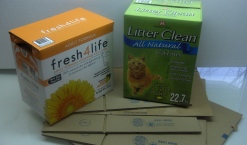

Cat litter may not sound like much of a high-tech product, but as leading pet supplies manufacturer Normerica Inc. has recently discovered, a little bit of modern-day high-tech can go a long way in keeping your key retail customers happy.
Operating six strategically-located manufacturing facilities around the world—including Canadian-based production plants in Toronto, Brantford, Ont. and Lethbridge, Alta.—the Toronto-headquartered company ranks as one of largest producers of premium-grade clumping cat litter made from sodium bentonite clay, shipping it to the world’s leading retailers such as Walmart Stores, Inc., Costco Wholesale Corp., PetSmart Inc., Sobeys Inc., Safeway Inc., and many others.
Founded in 1991, the company processes nearly 800 million pounds of cat litter products at its North American facilities in Brantford—also housing production of the popular Nature’s Medley, VitaLife and Jawbone doggie treats—and at sister plants in Dyersburg, Tenn. and Glendale, Az.
“Each of our manufacturing facilities is fully-equipped with on-site quality assurance laboratories and staff,” says senior director of replenishment and IT Simon Than, stressing the importance of quality control as one of the company’s core competitive strenghts that have enabled it to grow into a $135-million-plus business.
“Because we are totally committed to quality and excellence, we take great care in maintaining each and every one of our products,” states Than, “and providing value-added services for mass merchandisers, wholesale clubs, grocery chains and pet specialty shops.”
So when mega-retailer Walmart recently began mandating its leading suppliers to start implementing pallet-level RFID (radio frequency identification) tagging for shipments bound to its RFID-ready distribution centers (DCs), Normerica saw it as an opportunity to get ahead of the packaging industry’s RFID learning curve, while providing Walmart with improved inventory accuracy and logistics management.
“We started working on a solution to integrate RFID with our hand-held scanning process,” recalls Than, “but we really wanted to avoid having to do the actual tagging ourselves.”
At the moment, CPG (consumer packaged goods) companies typically approach RFID tagging in one of two ways: the ‘slap-and-ship’ application of pre-printed labels; or the more involved ‘print-and-apply’ method, requiring
additional supply-chain infrastructure investment.
“We were aware that the print-and apply approach is very labor-intensive, and that’s what we wanted to eliminate,” recounts Than, who ultimately found what he was looking for from a new subsidiary of Normerica’s long-time corrugated box supplier Kruger Packaging Inc.
Started up in Montreal in 2007, HIDE-Pack is a sister Kruger Inc. company that has pioneered a proprietary, cost-effective way of embedding RFID chips containing Electronic Product Code (EPC) information into corrugated boxes produced at the Krupack box plant in Brampton, Ont.
“Krupack was already supplying us with corrugated boxes,” explains Than, “so when we asked them about embedding RFID tags, it turned out turns out they were already doing it themselves via a sister company.”
Advertisement

